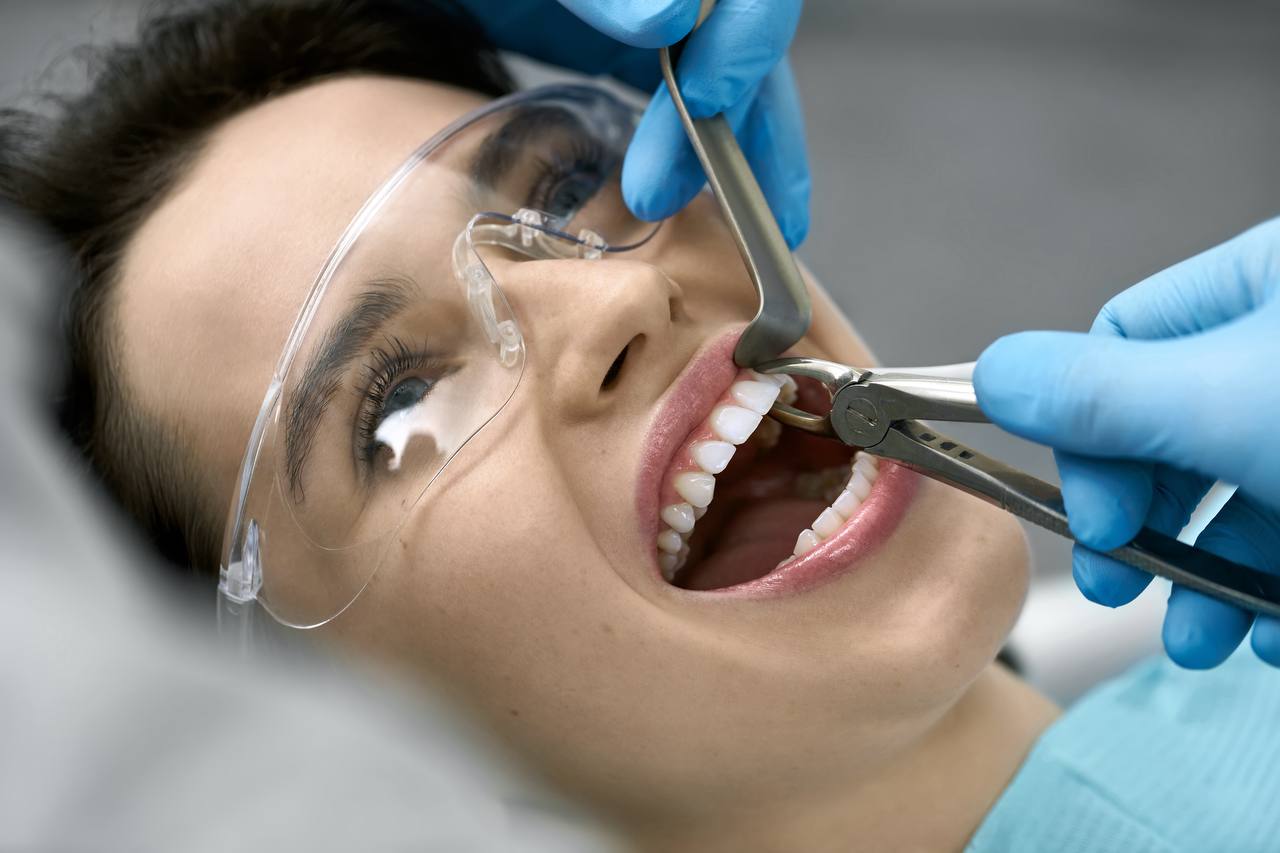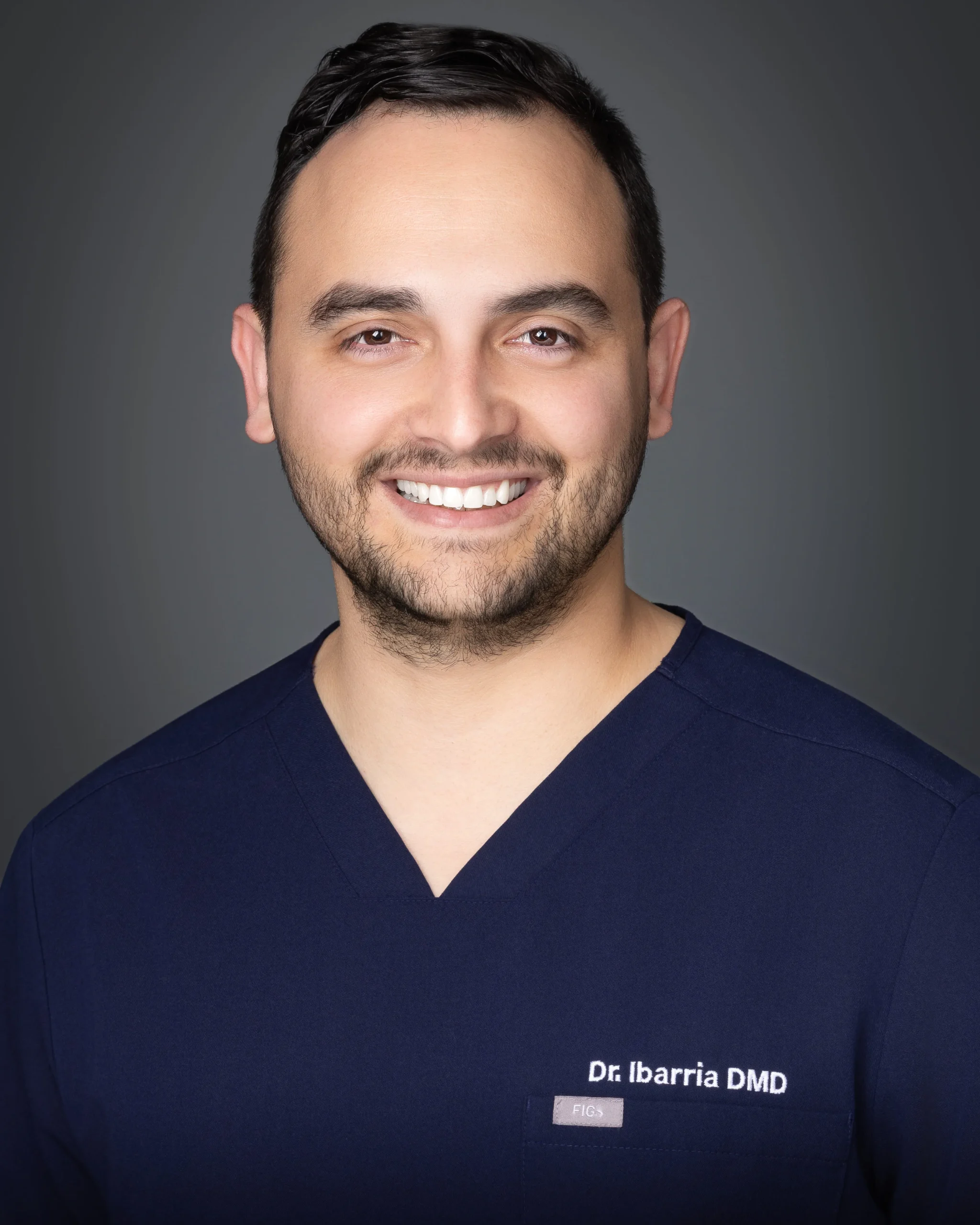
Tooth extraction becomes necessary for various reasons, including severe decay that has destroyed too much tooth structure to restore, advanced gum disease that has loosened teeth, impacted wisdom teeth, or overcrowding that interferes with proper alignment. In some cases, extractions are part of orthodontic treatment plans or preparation for dentures or implants.
Whatever the reason, our experienced team will thoroughly evaluate your situation and discuss all available options before recommending extraction. Our family dental services encompass both routine extractions and complex surgical procedures to meet every patient’s unique needs.
Simple extractions are performed on teeth that are visible in the mouth and have fully erupted. During this procedure, we carefully loosen the tooth using specialized instruments called elevators, then remove it with dental forceps. Local anesthesia ensures you remain comfortable throughout the process, and most simple extractions are completed within minutes. These procedures typically involve minimal discomfort and straightforward recovery periods.
Surgical extractions are required for teeth that haven’t fully erupted, are broken below the gum line, or have curved roots that make simple removal difficult. This procedure may involve making a small incision in the gum tissue to access the tooth, and sometimes the tooth needs to be sectioned into smaller pieces for easier removal. Wisdom teeth are commonly removed through surgical extraction, especially when they’re impacted or positioned at difficult angles.
Emergency extractions may be necessary when a tooth becomes severely infected and poses a risk to your overall health. Dental infections can spread rapidly if left untreated, making prompt intervention crucial for preventing serious complications that could affect your general health.
Wisdom teeth extraction represents a unique category of dental surgery that differs significantly from routine tooth removal. These third molars typically emerge between ages 17-25, often causing problems due to insufficient space in the modern human jaw. Unlike other teeth that serve essential functions, wisdom teeth are evolutionary remnants that most people can live without comfortably.
The extraction process for wisdom teeth is more complex than standard extractions for several important reasons. First, wisdom teeth often become impacted, meaning they cannot fully erupt through the gum tissue due to lack of space or improper positioning. This impaction requires surgical techniques to access and remove the tooth, often involving incisions in the gum tissue and sometimes removal of surrounding bone.
Wisdom teeth present unique challenges that make their removal more involved than typical extractions. Their location at the very back of the mouth makes access difficult, requiring specialized instruments and techniques. The roots of wisdom teeth are often curved or positioned near important structures like nerves and sinuses, necessitating careful surgical planning and execution.
Unlike front teeth with single roots, wisdom teeth typically have multiple roots that may be fully developed or still forming, depending on the patient’s age. Younger patients often experience easier extractions because the roots haven’t fully formed, while older patients may face more complex procedures due to fully developed root systems and denser bone tissue.
The proximity to the inferior alveolar nerve, which provides sensation to the lower lip and chin, makes lower wisdom tooth extraction particularly delicate. Upper wisdom teeth may be positioned near the maxillary sinus, requiring careful technique to avoid complications. These anatomical considerations make wisdom tooth extraction a specialized procedure requiring extensive surgical training and experience.
Comprehensive dental care for patients of all ages, delivered with warmth and expertise.

Pre-surgical evaluation for wisdom teeth involves detailed X-rays or 3D imaging to assess root position, nerve proximity, and bone density. We’ll review your medical history and discuss sedation options, as wisdom tooth removal often benefits from deeper sedation than simple extractions due to the procedure’s complexity and duration.
During the procedure, we create flap incisions to expose the impacted tooth and surrounding bone. If the tooth is severely impacted, we may need to remove some bone tissue or section the tooth into smaller pieces for safer removal. This sectioning technique, called coronectomy in some cases, allows us to remove the crown while leaving root portions that are intimately associated with nerves.
Recovery from wisdom tooth extraction typically takes longer than simple extractions, with initial healing requiring 7-10 days and complete healing taking several weeks. Swelling and discomfort are more common and may last several days, requiring careful pain management and specific post-operative care instructions.
Before any extraction, we’ll conduct a thorough examination and take X-rays to understand the tooth’s position and root structure. We’ll review your medical history and current medications to ensure the safest possible treatment. Local anesthesia is administered to numb the area completely, and we can provide additional sedation options if you experience dental anxiety or prefer extra relaxation during the procedure.
During the extraction, you’ll feel pressure but should not experience pain. We work systematically to loosen the tooth while preserving as much surrounding bone and tissue as possible. For surgical extractions, we take special care to minimize trauma to adjacent structures. Throughout the procedure, we monitor your comfort level and can adjust anesthesia as needed to ensure you remain comfortable.
After the tooth is removed, we’ll place gauze over the extraction site and provide you with detailed post-operative instructions. The initial blood clot that forms is crucial for proper healing, so we’ll explain how to protect it during the first 24-48 hours. Most patients experience minimal discomfort that can be managed with over-the-counter pain medications, and many return to normal activities within a day or two.
Proper post-extraction care is essential for smooth healing and preventing complications. For the first 24 hours, avoid rinsing vigorously, drinking through straws, or smoking, as these activities can dislodge the protective blood clot. Apply ice packs to the outside of your face for 15-20 minutes at a time to minimize swelling, and stick to soft foods that don’t require extensive chewing.
Apply ice packs to the outside of your face for 15-20 minutes at a time to minimize swelling, and stick to soft foods that don’t require extensive chewing. After the first day, gentle rinsing with warm salt water can help keep the extraction site clean and promote healing. Gradually return to normal eating habits as comfort allows, but continue to avoid the extraction site when chewing for the first week.
Most extraction sites heal completely within 1-2 weeks, though the underlying bone may take several months to fully remodel. We’ll schedule a follow-up appointment to monitor your healing progress and discuss tooth replacement options if appropriate. Preventive care plays an important role in avoiding complications and ensuring optimal healing after any extraction procedure.
Dr. Ibarria’s extensive surgical training, including over 1,000 hours of continuing education from renowned professors, ensures that your extraction procedure is performed with the highest level of skill and care. Our practice philosophy emphasizes preserving natural teeth whenever possible, but when extraction is necessary, we’re committed to making the experience as comfortable as possible while preparing you for successful tooth replacement options.
Following tooth extraction, we’ll discuss replacement options to restore your smile’s function and appearance. Whether you’re considering dental implants, bridges, or partial dentures, we’ll help you choose the solution that best fits your needs and budget. Don’t delay necessary treatment that could prevent more serious complications. Contact Centergate Family Dentistry at (941) 379-7777 or schedule your consultation today to discuss your treatment options and take the first step toward optimal oral health.
A Dentist You Can Trust

Dr. Rodolfo Ibarria
Leading Dentist
CENTERGATE FAMILY DENTISTRY
Address
Give us a call
Fax
941-378-4616
Opening Hours
Monday – Thursday: 9:00 AM – 5:00 PM
Friday - Sunday: Closed
Schedule a Visit
It’s Easy
From your first consultation to your ongoing care, we’re committed to providing you with exceptional dental services in a welcoming environment.